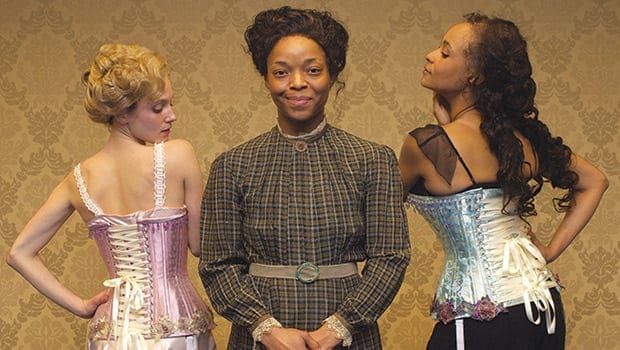

Author: Shanna TedeschSummer Williams directing Intimate Apparel with lighting designer Chris Hudacs and actress Amanda Ruggiero.
If You Go
What: Intimate Apparel
Where: The Lyric Stage Company of Boston
When: Friday, February 13 through Saturday, March 14
Tickets: $63, $57, $48, $42, $41 and $30; Limited number of $25 tickets available at every performance. For more information and to purchase tickets, visit www.lyricstage.com or call 617.585.5678.
“Intimate Apparel is a highly feminist play. It’s about women who are able to stand in their place in life regardless of what that place is, and they stand in it and they stand strongly,” says director Summer L. Williams of the drama by Pulitzer Award-winning playwright Lynn Nottage. The production opens at the Lyric Stage Company this Friday, Feb. 13.
Intimate Apparel tells the story of Esther, a single and lonely African American seamstress living in Manhattan in the early 1900s who “sews exquisite lingerie for wealthy socialites uptown, and women of ill repute downtown.” One day Esther receives a letter from a stranger working on the Panama Canal and begins a long-distance courtship with him, only to discover that he is not all what he seems.
Williams, who co-founded Boston’s Company One theatre company with several friends from Clark University in 1998, consciously chooses projects to direct that are written by African American playwrights.
“I’ve been really lucky to get to choose, which is great,” she says. “Because I choose, it’s the thing that speaks loudest to me and clearest to me, and they happen to be the best plays and the best writers. Telling stories that are complex and different, not because of ethnicity and not because of race, but because of the people. I’d like to see myself reflected in all sorts of ways in whatever I’m doing, because, hopefully, if I’m seeing myself reflected, somebody else is seeing themselves reflected. That’s important — and it doesn’t happen enough.”
Lindsey McWhorter, who makes her Lyric Stage debut as Esther, found the role attractive because she, too, could relate to Esther’s desire to be in a relationship. There was a point in her life where she was waiting for the right person.
“The older I got, I started to get a little worried if I would find the right person or if I would find the true love that I was looking for,” McWhorter says. “I also have friends and women in my life who I know are experiencing the same things. I think everyone could relate to Esther.”
The Medway-based actress, who received her M.F.A. from Brandeis and a B.A. from Alabama State University, always knew she had a passion for performing.
“There was something that happened to me when I was dancing on a stage,” she says. “I don’t know if it’s just from growing up dancing in church, and just like the whole spirituality of it, but I think that might have been what the director of the theater arts department saw. She saw that I had the ability to act while I was dancing.”
As a result, McWhorter received a full scholarship for theater and shifted her focus.
“Once I got into the program, I was a little hesitant and a little shy but I quickly translated that to acting and fell in love with the storytelling of it all.”
Director Williams began thinking about theater at the age of 15 when she attended the Freedom Theatre in Philadelphia. A mentor handed her Spell #7 from playwright and poet Ntozake Shange.
“It was the first time I read anything like it,” she recalls, “the first time I read a play that was doing so much. It’s such a cool, beautiful play that’s about exploring who you are as an artist. I was just mesmerized by it.”
As she takes on the challenge of directing Intimate Apparel, Williams realizes that it’s a risk for her in terms of form.
“I don’t often do period pieces,” she says. “I’m fascinated by Lynn Nottage and her writing. The Lyric audience, I think, meshes really well with the stories she likes to tell and the way she weaves history into those stories. I think it works.”
Williams says audience members will have different takeaways from the play.
“I think it totally depends on who you are and where you are in your life,” she says. “For me, the takeaway is you can dream and you can fantasize and those things can be real for you, they can be made real for you and you don’t ever have to settle.”
McWhorter’s take is that “no matter what our religious background is, our beliefs, our class, we still have the same struggles and we still deal with the same things and that unites us and that’s what I love about theater in general. You have people, rich, poor that come to see theater and you can all relate to the story.”






